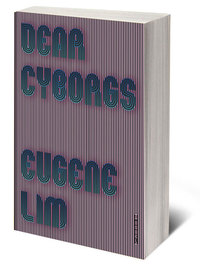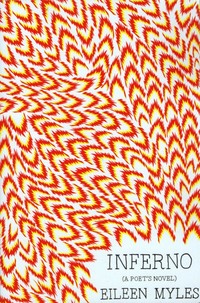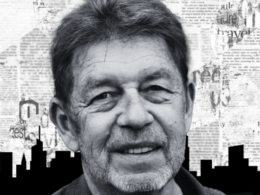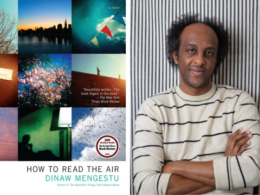Library of America’s series of guest posts by contemporary American writers returns with the following contribution from Eugene Lim, whose novel Dear Cyborgs has just been published by FSG Originals.

In a concise 176 pages, Dear Cyborgs interweaves two narratives: one about two isolated Asian American boys in the Midwest who bond over a mutual love of comics, and the other about a group of disaffected superheroes pondering resistance strategies in the era of late capitalism.
Novelist Jonathan Lethem, who just edited the anthology Shake It Up: Great American Writing on Rock and Pop from Elvis to Jay Z for Library of America, is already a vocal fan of the novel, telling The Chicago Review of Books that it “blew me away with its deceptively blithe mixture of cryptic humor, philosophical ingenuity, and genuine political yearning. . . . I hope it makes a splash out there in this overcrowded world.”
Below, Lim pulls the curtain back on the literary and extra–literary influences that went into his new book.
Tan Lin’s Insomnia and the Aunt; Yongsoo Park’s Boy Genius. These two outlier novels—outstanding and sublimely strange—gave me proof of concept of a different American narrative. For a long stretch of my life, alternatives or subversions of a necessary but increasingly familiar Asian American assimilation tale were very hard to find. (Thankfully, there’s recently been an increase of diversity in published Asian American narratives—an increase that can be directly traced to the wave of second–generation Asian Americans now coming of age and into power after the 1965 Immigration Act.) Insomnia and the Aunt takes the bones of a traditional assimilation plot and grafts a greased, always slippery syntax upon it along with a sly, pointed cultural criticism. And 2002’s Boy Genius is a ferocious picaresque akin to the bawdy and hilarious provocations of Paul Beatty’s The White Boy Shuffle or Percival Everett’s I Am Not Sidney Poitier.
Gilbert Sorrentino’s Imaginative Qualities of Actual Things; Mary Gaitskill’s Veronica. Few would couple these two writers together, but to me they are both immaculate, exacting American stylists who have long been my mental travel companions. These two books have uncanny, meandering but purposeful architectures and are both jaw–droppingly vituperative as well as impossibly beautiful.

Robert Creeley’s The Island; Eileen Myles’s Inferno. And speaking of impossibly beautiful, both Creeley and Myles have written “poet’s novels,” a genre I happen to love. The poet, like the artist, must always be present, and these two manifest the writing mind writing—the leaps and curves of thought—in a masterful, palpable “real-time” way.
Tehching Hsieh’s Out of Now. And speaking of the artist being present, the great illegal immigrant and prime mover of performance art, Tehching Hsieh, was the spiritual overlord of Dear Cyborgs and an artist of unrepeatable example. His durational art speaks for itself—and/but everyone should pick up, borrow, or steal Out of Now: The Lifeworks of Tehching Hsieh and meditate under its star.
Andy Kaufman’s life and death; Ray Johnson’s life and death. And speaking of lifeworks, these two zany Zen masters (I was delighted to find the latter’s letter to Tehching Hsieh in the back of Out of Now) have not stopped teaching. I’m not sure exactly what the following means, but it’s what I wrote in my notebook one day:
Solutions to plot problems (for comic scenes):
WHAT WOULD RAY JOHNSON DO?Solutions to plot problems (for tragic scenes):
WHAT WOULD ANDY KAUFMAN DO?
Richard Aoki; Kiyoshi Kuromiya. Speaking of murky false dichotomies, two Japanese American men who also haunt Dear Cyborgs are Richard Aoki and Kiyoshi Kuromiya. Both spent childhoods in the internment camps, and both became brilliant and defiant protest leaders. Aoki is, if not very well–known, much better–known than Kuromiya and belongs to the triumvirate of 1960s Asian American activists whose other members are Grace Lee Boggs and Yuri Kochiyama. That canonical position is endangered, however, by recent accusations that Aoki, leader of the Third World Liberation Front strikes and the highest ranking non-African American member of the Black Panther Party, was an FBI informant. His life story has the makings of a fantastic novel, one with a hopelessly unreliable narrator and a timeline bejeweled with American tragedy.
Perhaps more noble and consummate (and in its scandal-less purity, less signal–boosted) is the activism of Kiyoshi Kuromiya. Kuromiya, an early member of Students for a Democratic Society (SDS) and the Student Nonviolent Coordinating Committee (SNCC) who protested and got beaten in Selma, created the Critical Path newsletter (an early and important bulletin about AIDS healthcare) and was a friend and colleague of Martin Luther King Jr. and Buckminster Fuller. Aoki’s life has been told in a kind of annotated oral history in the admirably researched biography Samurai Among Panthers by Diane Fujino. As far as I know, a book-length biography of Kiyoshi Kuromiya has yet to be published.
Eugene Lim is the author of two novels prior to Dear Cyborgs, Fog & Car (2008) and The Strangers (2013). His writing has appeared in The Brooklyn Rail, Fence, the Denver Quarterly, Little Star, Dazed, and other publications. The founder and managing editor of Ellipsis Press, Lim lives in New York City.



